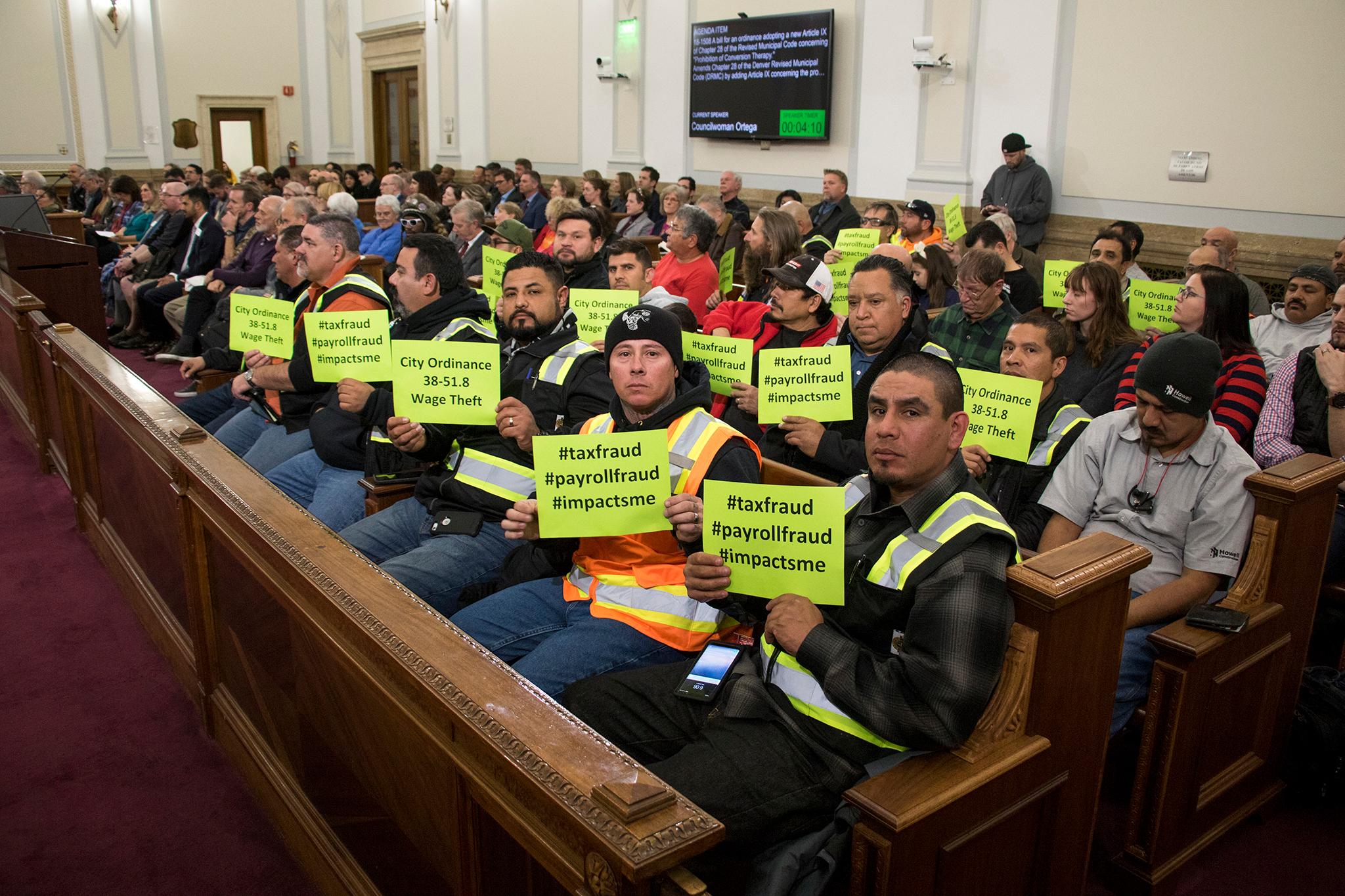When Michael Ginzel did a week of construction work for a contractor in Denver, Ginzel said his employer told him to expect a check in the mail. Weeks went by with no money, and Ginzel's calls went unanswered. He showed up to the employer's house in person and found himself in what he called a combative and dangerous situation.
"I was desperate, I had no money, no work," Ginzel told City Council at this week's Finance and Governance Committee public comment session on fighting wage theft. "It's not necessarily about doing what is right for the workers, it's also about protecting their safety."
City Council is weighing an ordinance that would strengthen protections for workers experiencing wage theft.
It has the support of labor leaders, but businesses worry it will add bureaucracy and harm small businesses. On Tuesday, Council members on the Finance and Governance Committee expressed support for the proposal, but voted to postpone passing it to the full council in order to answer additional questions and engage with businesses. A special meeting to vote on sending the proposal to the full council is scheduled for Dec. 20.
Discussion of the ordinance comes during a year where Denver recovered a record $1.1 million in wages for workers in 2022, compared with around $690,000 in 2021 and around $1 million in 2020.
A report from the Colorado Fiscal Institute estimates that employers steal an estimated $728 million from workers across the state, with low income workers, workers of color and women most at risk. The report estimates that this translates to an approximate $45 million in lost tax revenue for the state.
In 2022, one of the biggest sums recovered in Denver came from a $207,000 case for 35 people working for trash removal services and disposal site contracts, where the contractor was incorrectly claiming benefits like health insurance, paid time off or retirement plans.
Another investigation recovered about $48,000 for 107 employees working for a valet parking company, which was underpaying its staff and independent contractors. "Valet companies were one of our most common areas of underpayments this year," wrote city Auditor Timothy O'Brien in his report. "We identified underpayments of more than $111,000 for workers in that industry alone."
A third case recovered money and got a raise for an Afghan refugee getting paid below minimum wage. The auditor's office did not include the person's job, or name any specific companies in its report.
"We encourage any community groups to reach out if they know of a possible underpayment," O'Brien wrote. "The minimum wage applies to all work performed in the City and County of Denver, regardless of a worker's immigration status."
In 2023, Denver's minimum wage is increasing from $15.87 to $17.29 per hour, except for people in the food and beverage industry, who can claim up to $3.02 per hour in documented tips.

City Council's ordinance would strengthen protections for workers against wage theft.
Councilwomen Stacie Gilmore, Candi CdeBaca and Amanda Sawyer, and Council President Jamie Torres, sponsored an ordinance on preventing wage theft at Council's Finance and Governance Committee on Tuesday.
The new policy would allow worker complaints to go directly to the auditor. "By avoiding courts and threats of jail time, workers can get paid more quickly," wrote the Council members in a presentation on the ordinance.
Torres explained that employers sometimes avoid paying out owed wages by classifying workers as independent contractors, which is why the ordinance would expand to include independent contractors as well. It would also allow workers to take their complaints up the chain of command, even if their employer is insolvent and cannot pay.
The ordinance would also give workers the opportunity to bring a civil action to court, instead of going through the auditor.
The sponsors emphasized that the proposal is not meant to unfairly target accidental theft, and that the auditor has flexibility in penalties imposed.
"We're really going after people who are intentionally withholding wages, do not fix issues in 30 days and/or do not cooperate with investigation, so this is not intended for people who make an honest mistake," CdeBaca said.
At the committee meeting, people who had experienced wage theft shared their stories.
Construction workers spoke about being pressured to classify as self-employed, not getting overtime pay and not being able to qualify for unemployment. Labor leaders also recognized that wage theft makes it difficult for lawful businesses to compete.
David Hernandez spoke on behalf of painters, drywall finishers and other construction workers. He said his union found in a survey that one in six of their workers had experienced wage theft. "Like me, there are workers everywhere being victims of wage theft," he said. "Not only that, but there are many companies that take advantage of these workers' immigration status."
Labor organizer Alejo Gonzalez shared the stories of home care workers, who are predominantly women of color, including someone who had to live in her car and another who skipped meals after checks bounced.
"Every day this happens," Gonzalez said. "The coffee that some of you are drinking, those baristas are experiencing it. The lunches and dinners you had, those restaurant workers are experiencing it."
Business leaders denounced wage theft, but said Council's proposal would hurt the business community.
Leaders expressed concern with the ability for workers to bring complaints up the chain, saying that it could disproportionately affect small and minority owned businesses that have not done anything wrong.
Jess Kostelnik, who spoke on behalf of the Denver Metro Chamber of Commerce, condemned wage theft, but said that Colorado already has strong state and federal protections. "We seriously question the need for and efficacy of Denver's wage theft proposal as it is currently written," she said. "[It] would make owning a business and doing business in Denver even more bureaucratically nightmarish."
Others asked for a delay. "Let me be clear, we do not support wage theft, we strongly believe that everyone should be paid for their work," said Kate Barton, Chief of External Affairs for Downtown Denver Partnership. "We want to ensure that the entire business community, those that are most impacted by this policy, have the opportunity to provide meaningful feedback and ensure this policy has the desired impact."
CdeBaca said that in developing the ordinance, the city looked at states like Maryland and Massachusetts with similar legislation that allowed liability for wage theft to go up the chain of command. "There's still obviously business going on, still obviously construction going on at unprecedented levels," she said.












